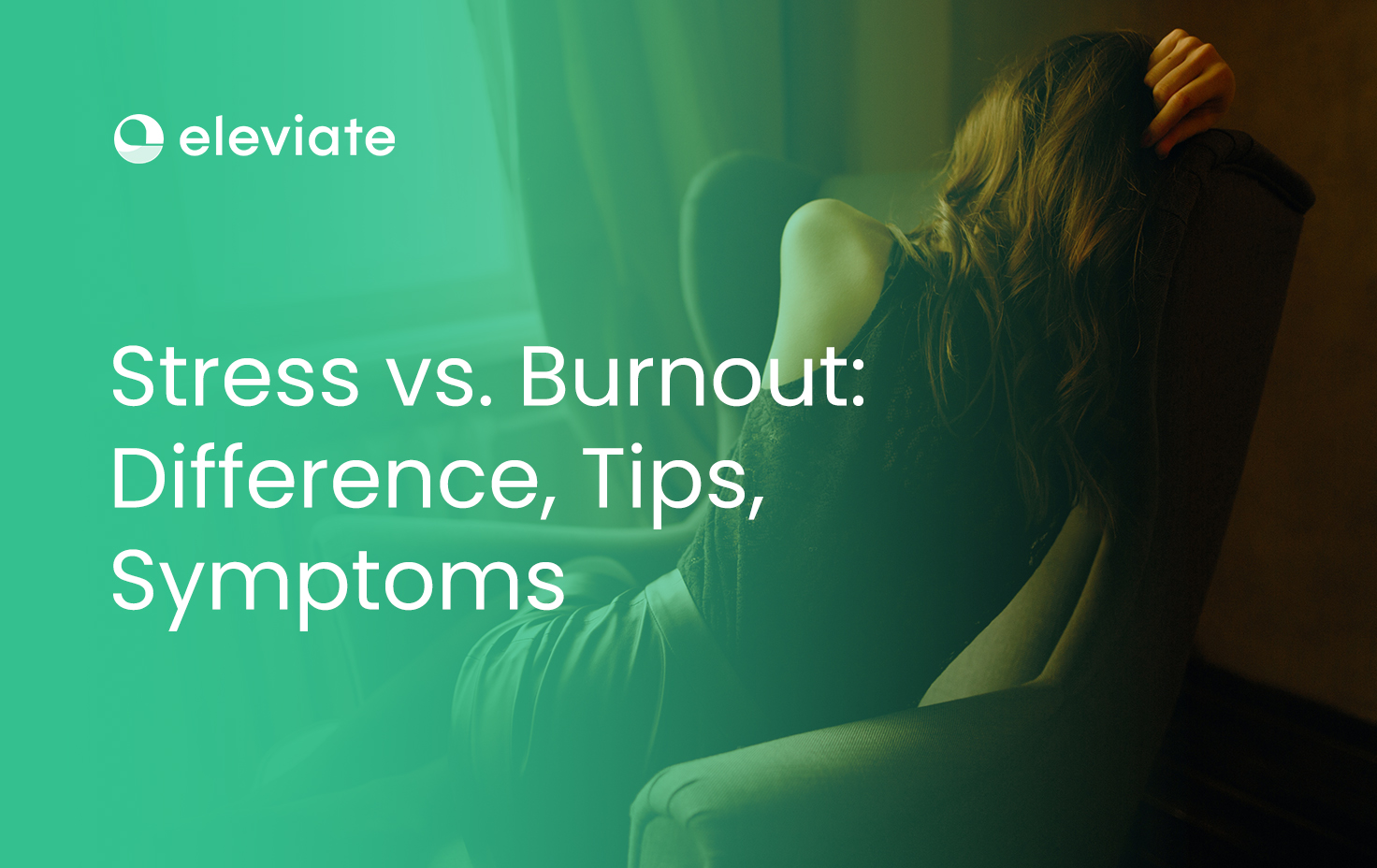Mental disorders are among the most common health issues people have to deal with in modern life. Due to the heavy workload, hectic lifestyle, and other personal issues, it becomes harder to find balance, relax, and unwind. All these factors combined usually result in stress or burnout. No matter how common these health conditions are, they aren’t easy to deal with, especially if you can’t tell one from another.When you compare burnout vs. stress without further research in the field, it may seem like they are one and the same representation of your current mental state. Even though such popular assumptions circle around the web, the two conditions are very different. Thus, the sooner you spot the signs of stress and burnout, the easier and safer it will be to deal with it and eliminate the condition. That is precisely what we will do together in this article.
How do you differentiate between stress and burnout?
Unfortunately, there isn’t a single diagnostic and statistical manual that can help you define each condition separately. Very often, the two overlap, and the line between them isn’t that easy to spot. Yet, it is safe to say that stress can still have a more positive connotation since it can be associated with pleasant events such as weddings, celebrations, travel, and so on. Burnout, on the other hand, does not have a single touch of positivity to it.
Both of these things can happen due to situations at work or home. Nevertheless, burnouts are incredibly common for corporate workers. Sometimes, you may feel like you have arrived at the point where you can’t move any further, and being stuck is what burnout usually feels like.In the majority of cases, burnout is referred to as the older sister of stress. A person who is stressed for too long will inevitably transition into burnout. Yet, while it is possible to take a day or a week off and recover from stress, dealing with burnout isn’t that simple. It is often advised to apply some coping strategies to the routine or consult a specialist to find a way out of trouble. We will discuss it a little more as we proceed with the guide.
What does burnout feel like?
Your mental health can be incredibly fragile and susceptible to all sorts of trauma if you leave it unattended. A typical burnout refers to a mental, physical, or emotional state a person goes into after a lengthy period of being under pressure. Due to the emotional stress, you can feel depressed, cynical, overwhelmed, and unable to carry out different tasks. Usually, the specialists point out three main stages of burnout:
emotional exhaustion;
a feeling of ineffectiveness;
lack of personal accomplishment.
There are general symptoms that fit a burnout syndrome description. The better you are aware of these, the sooner you will be able to identify and solve the problem without further damaging your mental health.
Sleep disorder
Anxiety, as well as burnout, can affect your sleeping patterns. However, unlike stress, burnout means that you can sleep day and night, but you won’t feel rested. Very often, it feels like you could stay asleep forever since there is nothing else you care about in this life. When your sleep-wake cycle is disrupted, it is time to see a doctor.
Fear of going to work
Chronic workplace stress can lead to typical job burnout. However, if left untreated, the condition may inspire work-related dread. In the majority of cases, people who would rather get fired than go to work the next day suffer from burnout. The same refers to those who start their morning at the office thinking how great it’d be to leave the place in the evening.
Lowered immunity to disease
People suffering from burnout usually show distinct illness patterns. They get sick more often than their co-workers or family members, and it takes them longer to battle the condition. The ties between your mental and physical state are incredibly tight, even though they are often underestimated.
Lack of motivation
One of the most common burnout symptoms would be the loss of motivation and a sense of purpose. Everything you do at work seems to require much more effort, and you keep pushing yourself to the limit. Such job burnout is also likely to have a negative toll on your family life. If you don’t reach out to a mental health professional at this stage, you may lose interest in the rest of your daily activities, which borders on chronic depression and worse.
Personal isolation
Remember those times when you were all in for a weekend out with friends and family? If you are suffering from burnout, the chances are that you are no longer interested in things like that. All due to the feeling of guilt. It assumes that if you can’t cope with the workload effectively, there is no chance that you are wasting all that spare time on something fun and relaxing.
Decreased performance
When you feel burned out, your creative side suffers from it too. It takes time for you to focus, and you are making more mistakes than usual. You constantly ask your colleagues to repeat themselves so that you can make some sense of what they are saying. This results in longer hours spent at work and even greater stress accumulation. You bring all those negative emotions with you home, and thus, your personal relationships start to take the wrong turn.
What does stress feel like?
When you can recognize the physical symptoms of burnout, you may want to learn a little more about stress. The definition of stress reads as a person’s response to various disturbing factors in their surroundings. Often, such responses are reflected through physical, psychological, and behavioral changes. You should pay attention to the following popular symptoms of the condition.
Tiredness
One of the most common physical signs of anxiety is feeling tired due to the release of hormones into the bloodstream. If you have trouble sleeping, this may also be a direct stress indicator. Yet, compared to burnout, stress makes it hard to fall asleep since you may be fixated on the same problem, and playing it over and over in your head will keep you awake.
Headaches
When you are feeling overwhelmed 24/7, it can’t but lead to regular headaches. They may come and go for no obvious reason, but it is a clear sign that you are feeling stressed and should seek professional help.
Irritation
Irritation is one of the early signs of the issue. As the problems pile up and you find it difficult to cope with the situation, everything that goes out of your control will annoy you. These don’t have to be table-turning events, something small may have one of the greatest mood swings your loved ones have ever faced.
Tearfulness
Some people skip the irritability stage and face tearfulness instead. Anything that you can’t put up with the way planned would make you cry. However, that is not necessarily one of the negative effects of stress. According to the World Health Organization, crying can also help you deal with the condition effectively while you are stressed.
Lack of sexual drive
Physical fatigue and too much stress may lead to a decrease in your libido. If you’re losing interest in sex, find a specialist to investigate the symptoms and determine your state and mental condition.
Eating disorders
Job stress usually means you have too many responsibilities to deal with, and thus you don’t have time to eat well. Such situations often lead to unhealthy diets. Please note that short-term stress may result in a loss of appetite too.
Key differences and similarities between job stress and burnout
To oppose stress vs. burnout and draw a final line between the two conditions, let’s review two comparison tables with primary similarities and differences that concern the two:
Differences

Similarities

5 ways to deal with stress
It is not enough to highlight the main difference between stress and job burnout. You need to develop coping strategies even if you don’t have a precise medical diagnosis at hand. There are 5 popular wellness tips to keep the condition at bay.
Meditation
Physical activity
Organization
Time out
Self-care
#1 Meditation
Practicing well-being and mindfulness is a shortcut to keeping your mental state balanced. Whether it is the first thing in the morning or a few minutes of meditation before you go to bed, the practice will help you unwind and leave your daily worries behind. Meditation will positively affect your circadian rhythms so that nothing disrupts your sleep habits. Such an approach will help you wake up fully rested, and all the early birds and night owls won’t feel shattered and empty after a stress-affected sleepless night. Moreover, regular meditation practice will serve as a preventive factor so that the above-mentioned condition won’t easily affect you.
#2 Exercising
You should opt for some physical exercise whenever you start feeling overwhelmed. Surely, it may sound like a cliché, but the scientific proof behind the release of feel-good hormones remains unchanged. Even a 10-minute walk around the block will provide the necessary energy boost so that your internal clock returns to its usual unstressed pace and your general well-being improves. Keep in mind that stress affects the muscles too. Thus, a few minutes of yoga practice or even 15-20 jumping jacks will help you relieve all that unnerving tension and get back on the productive performance track. It is incredible how something as simple as exercising can work miracles on your body and mind.
#3 Self-organization
Imagine feeling like you are constantly running out of time and you can’t do anything right. That is precisely how stress-induced anxiety disorders make you feel. However, in reality, things may not be that complicated. Thus, a proper systematic review and a bit of self-organization would serve as the most effective coping strategies. Once you compose an up-to-date to-do list, it will be easier to carry out all the tasks you have to deal with and track your progress. Such an approach will help you decrease your anxiety and manage your fatigue.
#4 Time out
There are cases when you have little or no control over the ongoing situation, which is the central aspect that bothers you to the point of a nervous breakdown. It is critical to realize that the stability of your mental state and the health of your nervous system should always be prioritized. When you start feeling that you are about to give in to despair, take a time out. What does it mean? A time-out implies that you leave every work-related task and focus on yourself. You can meet up with close friends, take a walk in the park, read a book you like, or simply enjoy listening to your favorite music. Such self-compassion will help you manage your anxiety levels so that you will succeed with other problems more effortlessly.
#5 Self-care
Both physical activity and meditation belong to the most effective self-care routines. However, each can be used separately to relieve anxiety symptoms. Yet, there is something else. There are beauty care routines that make people happy too. Let’s say a candle-lit dinner for two or just for yourself, a relaxing bath, a trip to the hair salon, a soothing massage, relaxing stretching before going to bed – you name it. Anything that makes you feel better, more good-looking, and essentially happier will help you deal with your current mental condition. If you keep practicing such activities, you will be amazed at how fast you can successfully manage stress.
5 practical ways to deal with job burnout
You have already figured out that when compared to stress, burnout symptoms are slightly different and more health threatening. Thus, make sure to keep a close eye on the first behavioral signs that you are burning out. Yet, if you can’t prevent burnout, it is crucial that you know some of the main coping strategies to apply to your routine when dealing with the condition. There are 5 primary tips to keep in mind. They are the following:
read the signals;
disconnect;
no new beginnings;
establish a support system;
find another job.
#1 Listen to your body
Burnout can be easily recognized by placing only three symptoms in front of you. They are cynicism, ineffectiveness, and exhaustion. Once you notice those things about yourself, you should drop anything you have been doing and unwind. It is utterly easy to let another headache or restless night go unnoticed. However, the more you tell yourself how much you hate this or that and seem not to find happiness in anything around you – it is time for a break.
#2 Practice disconnection
Your life is surely full of deadlines and pressing matters. Technological progress makes it twice as easy to work from home, check work-related messages before going to bed, and so on. In case you still don’t realize it, that is a perfect opportunity for job burnout to accumulate. That is why one of the best ways to keep the condition at bay would be to disconnect from work at all levels, including digital. Don’t check your mailbox until your workday starts, and try not to bring work home. Even if you have to attend to some business matters during the weekend, plan those working hours and don’t exceed them.
#3 Don’t start new projects
If you are used to dealing with everything on your own, it may be impossible to say ‘no’ to something new that heads your way. Yet, if you want to take healthcare to another level and completely rule out the feeling of burnout, be sure to finish any ongoing business and take a lasting break after it. No new beginnings and fresh commitments before you get out of the burnout state. Otherwise, you will only deepen the consequences and mental toll of burnout.
#4 Build a support system
According to recent clinical psychology research, people dealing with burnout are more likely to withdraw from those they care about most. It is critical for your effective work-life balance to have room for social support. You don’t need a medical diagnosis to go out and chat with a friend you haven’t seen for a while or plan a family trip the next weekend. You should remember that work can wait, and your mental stability requires your utter attention here and now. People close to you will supply all the positive emotions you lack, so you will be able to get through the burnout without dire consequences.
#5 Switch jobs
Unlike stress, burnout can have a more direct toll on your life, and at times, most wellness tips fail, and you don’t seem to recover from the ongoing pressure. If nothing else works, the only way to break out of the circle may be to find another job. The possibility may make you feel anxious, but in the long run, it will bring more excitement than anxiety. Besides, you can start by taking smaller steps. Fill out your CV with outstanding personality traits you value, observe the opportunities in other fields you wanted to try before, or switch to an opposite sphere – whatever works for you. Should you find it challenging to quit your current job, you can find a mental mentor who will guide you through the process so that you don’t feel overwhelmed and lost in the ocean of opportunities.
How can Eleviate help you deal with stress and burnout?
Our app is a source of all the essentials a person may need when facing mental health issues such as increased anxiety, stress, or job burnout. Aside from the theoretical information on the conditions, which will help you see through the problem and focus on the solution, we have an extensive practical database. Eleviate will help you organize your day, practice mindfulness, find a suitable exercise routine, and plan a healthy diet. On top of that, our growing community will provide the social support you need when battling mental issues. Certified professionals are there for you to offer expert help in your time of need!





